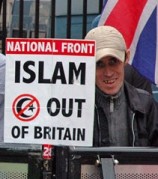Apologetically imperial: Liberals, political Islam, and a war of terror
By Ben White
Long before Nick Cohen ruminated on “What’s Left?” and Martin Amis imagined the sexual frustration of millions of Muslim men, even as the ink dried on opinion pages in the “liberal” New York Times, Guardian and Independent urging on the slaughter in Iraq, those on the left still committed to resisting imperialism were already ably despatching the accusations of “appeasing Islamofascism”. It is not my intention to repeat those thorough demolitions here.
However, an interview earlier this month in the Guardian with the New Statesman‘s political editor Martin Bright afforded excellent insight into how leading “liberal” writers have justified (to us and themselves) their support for the reactionary policies of the “war on terror”.1 Bright is a more recent addition to the imperial left club, having risen to prominence through his long-running investigation into what he called the British Foreign Office’s “love affair with radical Islam”, an interest that has fed a documentary, numerous articles, and a think tank policy paper.
The interviewer gives Bright space to vent, principally towards those on the “liberal left” who have the temerity to accuse him of Islamophobia: “There is a tendency on the British left to believe that the ‘wretched of the earth’ have some sort of moral superiority to us in the West. That same tendency also associates anyone who opposes American or British so-called imperialism with the wretched of the earth.”
Twice, Bright refers to “the wretched of the earth”, an expression made famous by seminal anti-colonial writer Frantz Fanon in his book of the same name. Bright is not alone; Christopher Hitchens elaborated on this point in a book review in City Journal, claiming that “[many liberals] cannot shake their subliminal identification of the Muslim religion with the wretched of the earth.”2 Fanon is an unlikely ally, and to borrow from his theories deeply ironic (unintentionally). Fanon’s fiery prose, like other classic anti-colonial texts by Aimé Césaire, Sartre and Albert Memmi, still rings true today as a denunciation of the liberals’ approval of colonial violence and horrified moralising towards any resistance.3
More than forty years before the Time magazine specials on “Sunni jihadists” and a “Shia crescent”, Fanon sarcastically wrote that: “Colonialism will attempt to rally the African peoples by uncovering the existence of ‘spiritual’ rivalries … references are made to Arab imperialism, and the cultural imperialism of Islam is denounced.”4
It is not, as Bright supposes, that anti-imperial leftists attribute intrinsic moral superiority to “the wretched of the earth”, but rather that they defend the right of the colonised to resist colonialism; the occupied, occupation; the wretched, those who seek to maintain in perpetuity their wretchedness.


 Predictably, Joan Smith joins in the defence of Channel 4’s discredited “Undercover Mosque” documentary:
Predictably, Joan Smith joins in the defence of Channel 4’s discredited “Undercover Mosque” documentary: Attacking Asghar Bukhari’s criticism of the decision to award Salman Rushdie a knighthood, Liberal Democrat MP and leading National Secular Society member Evan Harris writes:
Attacking Asghar Bukhari’s criticism of the decision to award Salman Rushdie a knighthood, Liberal Democrat MP and leading National Secular Society member Evan Harris writes: